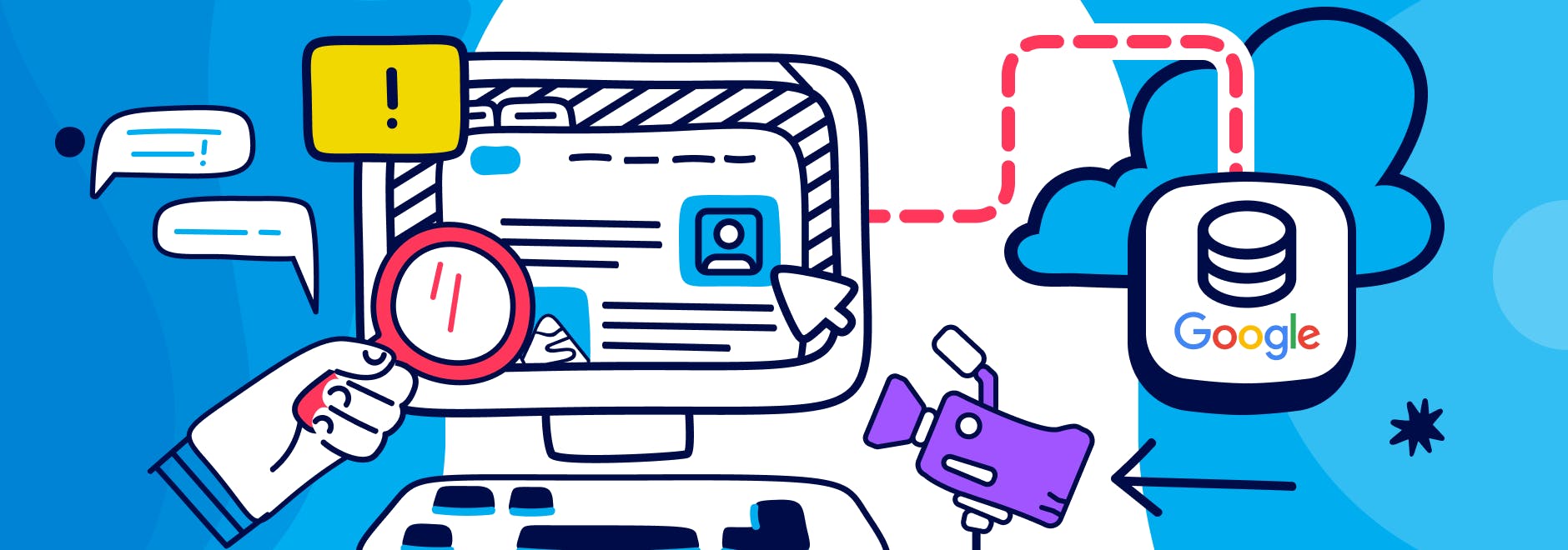Guide
What Does Google Know About Me?
Key Points:
- Google collects a lot of data from its users when they use its services, which can affect their online privacy and influence their decisions and behavior.
- Users can limit what Google knows about them by adjusting their privacy settings or using alternative tools like Ghostery, which is a private search engine as well as a tracker & ad blocker that does not collect or share personal user data.
- Ghostery lets users search the web without being tracked or shown ads. The browser extension also blocks trackers and advertising that may collect their data or harm their device.

What Does Google Know About Me?
Data privacy is a hot topic in today’s digital world. Every time we go online, we leave behind a trail of data that can reveal a lot about us.
But do we really know what information Google collects from us, and how it uses it?
We will explore what data Google collects, what it does with it, and how we can limit its access to our personal information.
Understanding Google’s Data Collection
Google is one of the most popular and powerful tech companies in the world. It offers a variety of services that millions of people use every day, such as Google Search, Gmail, Google Maps, YouTube, Google Photos, and more.
While these services are free to use, they are not free of charge. In exchange for using them, we have to share our data with Google.
Google collects data from its users in different ways:
- Some of the data is provided by us voluntarily when we create a Google account or use its services.
- Other data is collected automatically by Google when we interact with its services or devices.
- Some of the data is collected from third-party sources that partner with or are owned by Google.
What Data Does Google Collect?
When users interact with Google’s services, they share various types of information with Google. This is what we call Google data collection.
While Google’s data collection can offer users some advantages, such as access to useful and personalized services, such as Google Search, Gmail, and Google Maps, it also:
- Poses risks for users, as it can reveal their personal information to third parties who may have different intentions, such as advertisers, partners, law enforcement agencies, or hackers.
- Interferes with users’ online privacy, as it can monitor their online activity across different websites and apps and show them targeted ads and content based on their profile and behavior.
- Limits users’ online control, as it can collect data from various sources and devices and store it on Google’s servers, which may not follow the same privacy laws or regulations as the users’ location.
- Confuses users’ online understanding, as it can involve complex and opaque algorithms and policies that may not be clearly explained or disclosed to the users.
Below are some of the types of information that Google collects when we use its services.
Personal Information
When we create a Google account, we have to provide some personal information such as our name, email address, phone number, and photos.
We may also choose to add other information to our account, such as our birthday, gender, interests, and preferences.
This information helps Google to identify us and personalize our experience.
Search Queries and Interactions
Search history is the record of the queries you enter on Google or other search engines, which can help you find what you’re looking for faster and more easily.
Google tracks what we search for on Google Search and how we interact with its services. For example, it records what we watch on YouTube, what we read on Google News, what we ask on Google Assistant, and what we buy on Google Shopping.
This information helps Google to understand our behavior and preferences and show us relevant ads and recommendations.
You can manage and delete your search history from your Google account or your browser settings, or set it to auto-delete after a certain period of time.
Device Information
Google collects specific information about the devices that we use to access its services. This includes the hardware model, operating system, unique identifiers, and mobile network information.
The company also collects information about the device’s settings and status, such as battery level, signal strength, storage space, and app updates. This information helps Google to optimize its services for different devices and troubleshoot issues.
Location Data
Google collects data on location from our devices when we use its services that require or use location information.
For example, it uses GPS, IP address, sensor data from our device (such as accelerometer and gyroscope), and information about things near our device (such as Wi-Fi access points, cell towers, and Bluetooth-enabled devices) to determine our approximate location.
This information helps Google to provide location-based services such as Google Maps, Google Weather, and local search results.
Location history can also give you personalized recommendations and insights based on where you go, such as popular times, environmental trends, and travel tips.
You can view location history in your Google account settings to create a personal map of the places you visit and the routes you take.
Cookies and Other Tracking Technologies
Cookies and technologies like pixel tags are used by Google data collection to gather user data when we visit websites or apps that use Google services.
Cookies are small files that are stored on our device by websites or apps that we visit. They can store information such as our preferences, login details, browsing history, and more.
Pixel tags are invisible images that are embedded in web pages or emails that can send information back to Google when they are loaded.
These technologies help Google to track our online activity across different websites and apps and show us targeted ads and content.
Applications and Services
Google collects data from the apps, browsers, and devices that we use to access its services.
For example, it collects data from:
- Chrome browser (analytics, browsing history)
- Android operating system (app usage)
- Google Home devices (voice commands)
- Nest products (temperature settings)
User Activity on Websites and Apps That Use Google Services
Google collects user data from websites and apps that use its advertising and analytics services.
For example, it collects data from websites that display Google Ads or use Google Analytics to measure their traffic and performance. It also collects data from apps that use advertising platforms like Firebase or AdMob to develop and monetize their apps.
This information helps Google to provide these services to website owners and app developers and show us relevant ads across different websites and apps.
Google Ads
Google collects data based on our interaction with ads served by Google on various websites and apps.
For example, it collects data such as what ads we see or click on, how often we see them, and whether we take any action after seeing them (such as making a purchase).
This information helps Google to measure the effectiveness of its ads and show us more personalized ads based on our interests.
What Does Google Do With My Data?
Google services include apps like Gmail, Maps, Photos, and YouTube, as well as features like Google Assistant, Google Pay, and Google Drive.
Google uses the data it collects from us for various purposes. Some of the main purposes are to:
- provide us with its services
- improve its services
- personalize our experience
- communicate with us
- protect us
- generate revenue
Google uses the data it collects to provide us with its services such as Gmail, YouTube, Google Maps, and more. It also uses the data to improve its services by fixing bugs, adding new features, and enhancing performance.
The company uses the data to personalize our experience by showing us relevant content, ads, and recommendations based on our preferences and behavior. It also uses the data to communicate with us by sending us notifications, alerts, newsletters, and offers.
Google also uses the data to protect us by detecting fraud, abuse, and security threats and enforcing its policies and terms of service.
And finally, it uses the data to generate revenue by showing us ads and offering us paid products and services.
However, the way Google uses our data also has implications for our online privacy.
By collecting so much data from us, Google can create a detailed profile of who we are, what we do, where we live, where we go, and what we like.
This profile can reveal sensitive information about us such as our health, finances, relationships, and beliefs. It can be accessed by third parties such as advertisers, partners, law enforcement agencies, or hackers who may use it for their own purposes.
This profile can also be used by Google itself to influence our decisions and behavior by showing us certain content or ads that may not be in our best interest.
Ultimately, with services like Login with Google or Google Pay, we give a lot of identifying information about ourselves for convenience.
Is There a Way to Limit What Google Knows About Me?
Fortunately, there are ways to manage and limit what data Google collects from us. One way is to adjust our privacy settings on our Google account or device.
We can choose what types of data we want to share with Google or delete some of the data that Google has already collected. We can also opt out of some of the features that use our data such as personalized ads or location history.
Another way is to use alternative tools or platforms that do not collect or share our data with Google or other third parties.
For example, we can use a different browser than Chrome or a different email service than Gmail like Proton Mail.
Proton Mail is an encrypted email service which does not collect any personal data from its users, such as IP addresses, names, or payment methods. It keeps your email conversations private. Gmail collects data from its users, which can be easily combined with other data sources and used for advertising and other services.
We can also use a different search engine than Google Search that respects our privacy and does not track us online.
Protecting online privacy can also enhance our online experience, as it can improve our browsing speed, performance, and security.
How to export my Google Data
You can export or delete data saved in your Google account by going to the Download or delete your data section and choosing the action you need.
Follow these steps to select the data:
- Choose data to export or delete: You can select all the data you want to export or delete, from whichever Google platforms.
- Select file type, frequency, and destination: Choose the file type, how often to export the files, and where to send them.
- Confirm export: Review the number of data items selected (such as access log activity, search contributions, or account activity) and the date range the data covers.
Introducing Ghostery: A Privacy-Focused Alternative
One of the best alternatives to Google Search is Ghostery Private Search. Ghostery Private Search is a search engine that emphasizes privacy and does not collect any user data.
Unlike other search engines that track your online activity and show you targeted ads based on your profile, Ghostery Private Search does not store your search queries or personal information.
The company also does not share your data with any third parties such as advertisers or partners.
Ghostery Private Search delivers fast and relevant results without compromising your privacy.
Private Search is part of Ghostery’s suite of products that aim to protect your online privacy. Our company also offers Ghostery Tracker & Ad Blocker which is an extension for your browser that blocks trackers and ads that follow you around the web.
Ghostery Tracker & Ad Blocker lets you control what trackers you want to block or allow on each website you visit. It also shows you how many trackers are active on each website and how they affect your browsing speed and performance.
How Does Ghostery Protect My Online Privacy?
Ghostery protects your online privacy by giving you more control over your online activity and preventing third parties from accessing your personal information.
By using Ghostery Private Search instead of other search engines like Google Search, you can avoid Google data collection. You can also avoid seeing ads that are based on your profile or behavior which may influence your decisions or preferences.
By using Ghostery Tracker & Ad Blocker instead of browsing without any protection, you can avoid being exposed to trackers and ads that may collect your data or harm your device.
You can enjoy a faster and smoother browsing experience by reducing the clutter and noise on each website you visit.
And by using Ghostery’s products together, you can enhance your online privacy even further by creating a secure and private environment for yourself online.
Protecting online privacy can also reduce distraction caused by unwanted ads and trackers.
Steps to Switch to Ghostery
If you are interested in using Ghostery as your default search engine and tracker & ad blocker, here are some simple steps to follow:
- Go to our website and download Ghostery Tracker & Ad Blocker for your browser. You can choose from Chrome, Firefox, Safari, Edge, or Opera.
- Install the extension and follow the instructions to set it up.
- We recommend using the default settings; however, you can customize your settings and preferences according to your needs.
To use Ghostery Private Search:
- Visit ghosterysearch.com or set it as your default search engine in your browser settings. You can also access it from the Ghostery extension icon on your browser toolbar.
Enjoy browsing the web without being tracked or bothered by ads!
Final Thoughts
Google data collection is hard to escape. We can limit what Google knows about us by adjusting our privacy settings or using alternative tools like Ghostery.
Ghostery is a privacy-focused alternative that lets us search the web without being tracked or shown ads. It also blocks trackers and advertisements that may collect our data or harm our device. By using Ghostery’s products together, we can create a secure and private environment for ourselves online.
Protecting online privacy is not only important for individuals, but also for society as a whole, as it can safeguard our rights and freedoms in the digital age.
Online privacy is a serious issue that affects everyone using the internet. We encourage you to be proactive about your online privacy by installing Ghostery’s Tracker & Ad Blocker and search the web using a privacy-focused search engine like Ghostery Private Search.
You have nothing to lose and everything to gain by switching to Ghostery. Try it today and see the difference for yourself!
Get in touch if you have any questions. We’re always happy to help.

